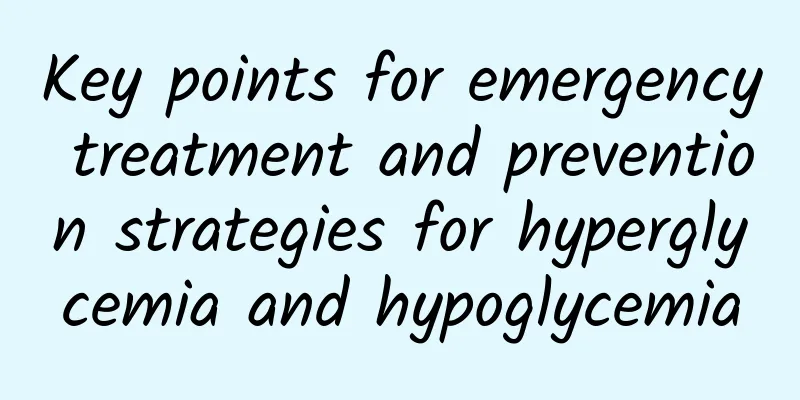Key points for emergency treatment and prevention strategies for hyperglycemia and hypoglycemia

|
Hyperglycemia (hyperglycemic crisis) and hypoglycemia (hypoglycemic crisis) are two extremes in diabetes management that can lead to life-threatening situations. Therefore, it is important for diabetic patients and healthcare providers to have a deep understanding of the key points of emergency treatment of hyperglycemia and hypoglycemia as well as prevention strategies. This article will explore these issues from an academic perspective and provide scientific and accurate guidance for diabetic patients. 1. High blood sugar (hyperglycemic crisis) (1) Hyperglycemic crisis, also known as hyperglycemic coma or diabetic ketoacidosis (DKA), is a common and serious complication in patients with diabetes. When faced with a hyperglycemic crisis, it is crucial to take correct first aid measures in a timely manner to avoid serious health consequences. ①Monitoring blood sugar levels: The first task is to monitor the patient's blood sugar level using a blood glucose meter. Knowing the current blood sugar value is crucial to deciding the next emergency measure. Normal fasting blood sugar is between 3.9-6.1mmolL, but the specific target range may vary depending on the patient's condition. If the blood sugar value is already outside the normal range, emergency action is required. ② Insulin supplementation: If the patient is an insulin-dependent diabetic, the doctor will usually recommend rapid insulin supplementation according to the patient's insulin treatment plan. This usually includes insulin injections, and the dosage and method should be carried out completely according to the doctor's instructions. The role of insulin is to help cells absorb blood sugar and transfer it from the blood to the cells, thereby lowering blood sugar levels. (2) Prevention strategies: Preventing high and low blood sugar levels is critical for people with diabetes, which requires a range of effective strategies and lifestyle management. The following is a detailed explanation of how to prevent high and low blood sugar levels: ① Regular monitoring of blood sugar: Regular monitoring of blood sugar is one of the key steps to prevent hyperglycemia and hypoglycemia. Diabetic patients should use a blood glucose meter to test their blood sugar levels according to the doctor's advice. These monitorings provide valuable information to help patients understand how their blood sugar is affected by diet, medication and lifestyle. Through timely testing, patients can detect high or low blood sugar early and take appropriate measures to correct the problem. ② Proper diet: Diet plays a key role in diabetes management. Adopting a balanced diet plan is essential to maintaining stable blood sugar levels. Here are some dietary strategies: 2. Low blood sugar (hypoglycemic crisis) Hypoglycemic crisis, also known as hypoglycemia or hypoglycemic reaction, is a common acute complication of diabetes patients and may be life-threatening in a short period of time. In the face of a hypoglycemic crisis, it is crucial to take correct first aid measures quickly to prevent the symptoms of hypoglycemia from worsening and reduce the adverse effects on patients. (1) Rapidly increase blood sugar: When patients experience symptoms of hypoglycemia, such as dizziness, weakness, trembling, sweating, palpitations, etc., they should take immediate measures to increase blood sugar levels. The most effective way is to take 15 grams of quickly digestible carbohydrates, such as glucose tablets or juice. These carbohydrates can quickly increase blood sugar and quickly relieve hypoglycemia symptoms. (2) Waiting: After consuming fast-digesting carbohydrates, patients should wait about 15 minutes to allow the carbohydrates to be absorbed and raise blood sugar levels. During the waiting period, patients may feel some relief from their symptoms, but they still need to wait to ensure that their blood sugar levels are stable enough. (3) Eating: Once the symptoms of hypoglycemia improve, patients should eat some long-acting carbohydrates, such as whole-wheat bread, biscuits or nuts. These foods can help maintain blood sugar levels and prevent hypoglycemia from occurring again. The intake of long-acting carbohydrates helps provide sustained energy and reduces the risk of hypoglycemia occurring again. (4) Seek medical attention: If the symptoms of hypoglycemia are severe, persistent, or unrelieved, the patient should seek medical attention immediately. This situation may require more in-depth evaluation and treatment to rule out other potential problems or complications. Medical professionals can take necessary measures based on the patient's specific situation, such as adjusting the medication regimen, providing medical monitoring, or further diagnosis. in conclusion Hyperglycemia and hypoglycemia are common risks faced by people with diabetes, but with the right emergency treatment and prevention strategies, patients can better manage these conditions. It is important that people with diabetes work closely with their healthcare professionals to develop a personalized treatment plan to ensure that their blood sugar levels are within a safe range while improving their quality of life and health. Scientific and accurate understanding of emergency treatment and prevention strategies will help reduce the adverse effects of hyperglycemia and hypoglycemia events on people with diabetes. Author: Liang Hongjing, Traditional Chinese Medicine Hospital of Yulin City, Guangxi |
<<: Tips on common respiratory infectious diseases in winter and spring
Recommend
Why does a woman's vaginal discharge turn brown?
For female friends who have brown leucorrhea, the...
What to do if breast acupuncture hurts
During the lactation period, women often experien...
Increased discharge in late pregnancy
In the later stages of pregnancy, some expectant ...
Does taking amoxicillin during breastfeeding have any effect on the baby?
Amoxicillin capsules are a relatively common anti...
5 novel "blood nourishing methods" to make women look full of complexion
Anemia can be treated with medication or diet. Di...
Is it better to lose weight during menstruation or after menstruation?
One of the most concerning issues for obese peopl...
How to stop breastfeeding during mastitis?
For a woman, giving birth to a baby is both a pai...
Does darkening of menstrual period affect pregnancy?
As we all know, the uterus is the best symbol of ...
Three common stages of sagging breasts
Young women have firm breasts because their breas...
Is it normal to have dull ovarian pain?
Many women find that there is a dull pain in thei...
Acute stage of encephalitis, complications? Teach you how to deal with them
In the sudden health storm of encephalitis, acute...
What are the causes of high testosterone in women?
Many female friends do not have a deep understand...
4 reasons why women's vagina becomes looser and looser
As people age, their private parts also show an a...









